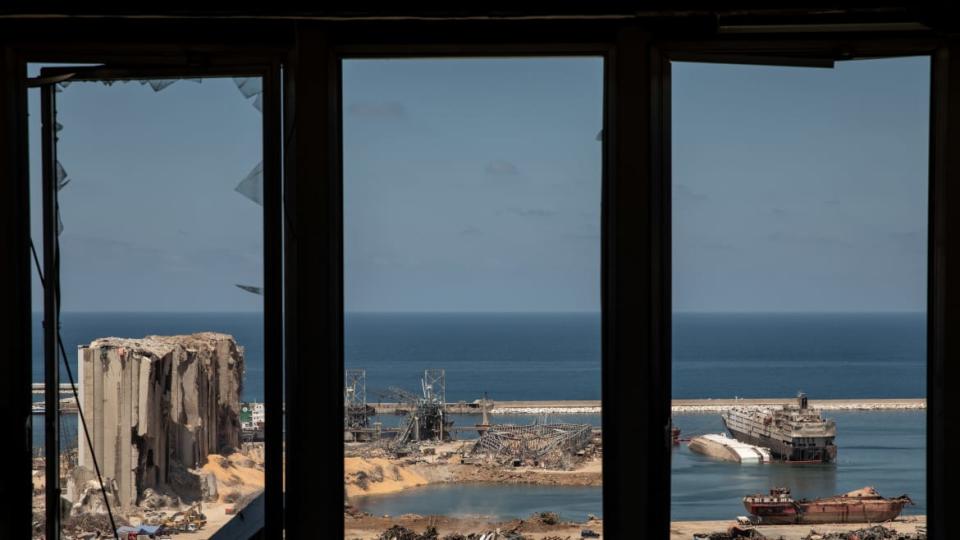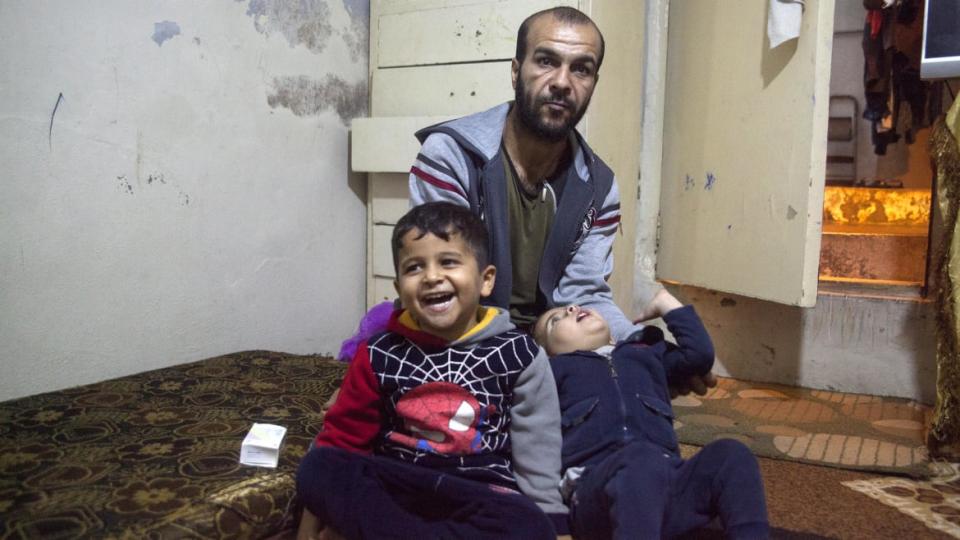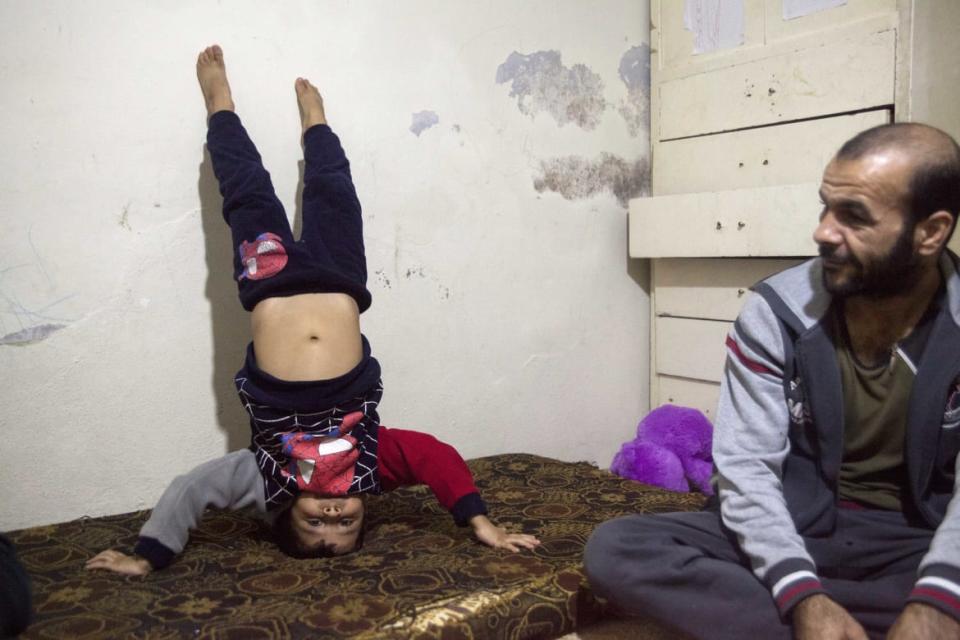How the Millions Raised to Rebuild Beirut Is Forcing Families From Their Homes

BEIRUT—Sitting in a one-room basement apartment in this city’s Fassouh neighborhood, Waad Hariri explains how her family lost their home following the catastrophic port explosion last year.
As her three young children run circles around her, and her husband sits calmly by her side, Hariri told The Daily Beast they had watched their three-bedroom home in the underprivileged neighborhood of Karantina be renovated following the blast, only for them to be evicted by the owner before it was completed.
“I was shocked, tired, and still suffering from the explosion. My mental state wasn’t stable. I have children and at the same time he was telling me to leave,” Hariri said, speaking hurriedly without skipping any details.
As NGOs and grassroots community collectives rushed to renovate some 70,000 homes that were damaged or destroyed in the Aug. 4 Beirut Port explosion—caused by the ignition of 2,750 tons of ammonium nitrate stored in a warehouse since 2013—some building owners saw it as a way to capitalize on their generosity.
Beirut Ignored Public Warning There Was a Russian ‘Bomb’ at the Port
Nadine Bekdache has been documenting eviction cases in Beirut since 2014 as part of a project called Housing Monitor, created by the design studio Public Works. Bekdache told The Daily Beast that threats and evictions have been on the rise since the explosion.
“Threats of eviction on these neighborhoods have been happening before the blast, [but] what becomes traumatic is when your house exploded and then you’re faced with eviction,” Bekdache said.
She said the real-estate market had been pushing for these inner-city areas to be developed and gentrified long before the port explosion.
“So the blast becomes an opportunity for these forces; any landlord that wants to get rid of their tenants can use the reason that the buildings are too damaged to live in,” said Bekdache.
After shocking videos of the blast raced around the world, individuals and governments were moved to try and help rebuild the battered city. In the absence of a reliable Lebanese government response, coupled with the public’s distrust in their management of money, online donation portals were launched in order to funnel in donations from overseas.
Impact Lebanon, for example, raised $9 million and vetted the NGOs on the ground that the money would be channeled to. Other smaller initiatives raised over $100,000 collectively, while world powers pledged $300 million in emergency aid.
Some of that money went to multiple NGOs that worked tirelessly on the ground following the blast to repair houses and make homes livable again, such as the local Offre Joie and the international humanitarian organization Medair, though the majority of renovations came from independent volunteers in Beirut who crowdfunded donations.
These NGOs have done a wonderful, much-needed job in helping to repair the homes of people who could never have afforded to make their homes safe themselves.
Unfortunately, that generosity has had some unintended consequences.
Hariri, 29, had been living in Karantina since she married her husband, Ra’ad, in 2012 and moved into the home he had been renting since coming to Lebanon from Dara’a in Syria’s south in 2006.
The Beirut explosion rocked their house while they were having dinner, blowing out all the doors and windows, destroying all of their belongings, and sending the family flying across the room.
“Of all the things we experienced in Syria, it was nothing like this,” Hariri said.

Ra’ad Hariri and his two sons sit in their one room apartment they have rented since being evicted from their house in Karantina following renovations after the Port explosion.
Hariri said after the explosion many NGOs came to survey the house and began to renovate the doors and windows.
“The owner started coming to check up on the house and the renovation, and eventually he said, ‘This month, I don’t want rent, but you have to vacate,’” Hariri said, adding it was only one month after the explosion.
The family refused to leave until the owner started getting aggressive, threatening and repeatedly creating a scene in the neighborhood.
“The wife of the landlord was telling us, ‘If you have a lawyer, I have a thousand lawyers; if you want to come and fight, I’ll fight back,’ Hariri said.
It is illegal in Lebanon to evict people without a court order, and since the first coronavirus lockdown in Beirut at the beginning of 2020, there was a law passed to suspend all judicial proceedings until the end of the year, making it impossible for owners to get one.
Still, evictions have been ongoing; Housing Monitor recorded 58 cases of threatened evictions affecting 190 people between Sept. 3 and Oct. 17. Of these cases, 23 were in Karantina and only 17 percent were Lebanese citizens.
The real number of evictions is likely to be much higher, considering collecting data on evictions is dependent on referrals and reports by tenants.
The government predicted that this would become an issue following the blast in August. A law was passed specifically for the areas affected, titled LAW 194/2020, stipulating rental contracts and prices can’t be changed for a year, and owners are not allowed to sell their properties.
An employee at the UN Human Settlements Programme (UN-Habitat) in Lebanon told The Daily Beast the law attempted to mitigate against gentrification and urban-renewal projects being undertaken following the blast, but it isn’t being monitored on the ground.
“We still hear of people that are being visited by investors, asking them to sell [their properties], so even if this [isn’t] allowed, if people don’t have access to support or aid, what are their options?” said the UN employee, who is not authorized to speak to the media, touching on the desperation felt in Lebanon’s current economic crisis.
Tenants are also being indirectly pushed out due to owners asking for an increase in rent following renovations, which is also illegal under the new law, according to Legal Action Worldwide lawyer Hadi Nakhoul.
Another employee at UN-Habitat told The Daily Beast there are many anecdotal stories they have received of landlords claiming the repairs were “so good” that the value of the apartment increased and therefore so should the rent.
“Others upgrade, especially areas in Karantina for example… the fact that now they can get money to rehabilitate is an opportunity to raise the rent, so they don’t want old tenants anymore,” said Bekdache from Housing Monitor.
Serving coffee in the single room where the five-member family both sleeps and eats, Hariri stressed it isn’t the NGO’s fault that they and other people were evicted from their home.
“They just get a call to come and fix the building, so they go there and fix the building… they have nothing to do with people getting kicked out,” Hariri said.
“The harm came from the landlord, no one else.”
Mohammed, from Hama, Syria, was left in intensive care for one week following the explosion.
Returning to his home after being discharged from hospital one month later, Mohammed, who asked for his last name to be withheld, was evicted from his house in Mar Michel district of Beirut after it had been renovated.
“I think the owner kicked me out because there is so much money involved... there were so many organizations coming to help… he wanted to take the benefits,” Mohammed explained, still unable to move his arm properly.
“When I left, no one called me, no one helped me, no one offered any services,” he said, adding he has been sleeping at friends’ houses ever since.
“The guy kicked me out with nothing, and I was still in a horrible health condition.”
One NGO conducting repairs to individual residential units within the buildings following the Beirut blast provided written comments to The Daily Beast, regarding people being pressured to leave their homes, on the condition their name not be published “due to the nature of [their] work.”
“In no instance while conducting the repairs [were we] aware of tenants being requested to leave by another party,” the NGO stated.
“[We have] not seen cases of owners evicting people from their homes after the explosion, while providing shelter assistance to vulnerable families as part of our emergency response programme.”

Staying in such a small space with three young children is difficult for the Hariris, considering they are used to running around in their neighborhood with friends.
Hariri and her family miss their home and community in Karantina, especially the kids.
“This is not like Karantina. There the kids were always playing outside but here it’s like they’re trapped in this house,” Hariri said.
“I honestly didn’t want to leave… the owner doesn’t have any right, [but] he used the explosion as an excuse.”
Get our top stories in your inbox every day. Sign up now!
Daily Beast Membership: Beast Inside goes deeper on the stories that matter to you. Learn more.

 Yahoo Finance
Yahoo Finance 